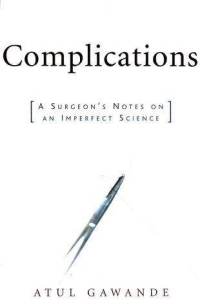Complications

I was going to write an opinion piece on physicians’ roles in fitness and nutrition as my first post returning from study-exile, but I’m going to write about something way more personal.
As you may or may not know, I wrote the equivalent of my board exams earlier in May to certify as a plastic surgeon. I got my results back this week and I didn’t pass.
Oddly, this hasn’t affected me as much as I thought it would. Yes, it’s embarrassing. Yes, it means I have to do them again next year. But if there’s anything that medicine as taught me, it’s that failure is inevitable. When we as surgeons and physicians fail, people get hurt, or die. And we can do everything right and work as hard as we can, and people will still get hurt, and people will still die. That is an inevitable part of our profession. Complications from surgery happen–infection, surgical failure, wound dehiscence, bleeding, deadly bleeding, damage to structures that aren’t supposed to get damaged; these are all things that can happen and are things that will adversely affect the outcome. Sometimes, it’s not too bad. Sometimes, it’s catastrophic.
However, the other lesson I’ve learned in the past five years is that the difference between a good surgeon and a great surgeon is how they handle their failure. The reality is that despite having a failure one day, you still need to be able to operate the next day. Patients will still need you and your expertise and your care. Failure can make a surgeon more cautious, but it should never paralyze him/her. A paralyzed surgeon is a useless surgeon. Respect for the operation is necessary, but a fearful surgeon is a useless surgeon. A great surgeon salvages failure as an unfortunate opportunity to learn, to improve and also to learn how to handle a complication. A great surgeon is the one who can recognize failure and fix it. A surgeon who has never had a complication is a surgeon who has never operated. A surgeon who has never failed, has never been truly tested.
Failure is the way in which weakness is identified. Without failure, there I can be no gauge of limits; no development of respect. Does this mean I needed to fail this exam? Uh, no. But I’m not ashamed of my failure. I don’t see myself as being any different of a surgeon from the day before I wrote it, other than knowing that my approach to the exam next time will be a little different, and I’m little poorer financially because these exams are _expensive_. I’m still moving to New York to do my fellowship in hand and wrist surgery. I’m still graduating as a board-eligible surgeon (for both Canada and the United States). I have received excellent training and my mentors don’t think any less of me and continue to support me and my goals. In fact, getting dumped hurt way more than this.
So, things don’t change an awful lot for me, other than the fact that I have to write this blasted test again. I had a complication. Most importantly, no one got hurt. And no one died. In the balance between failing an exam and failing a patient, I choose the exam. I’m still going to be a great surgeon/scientist. The world spins onwards. And most fitness/nutrition research still sucks and I will still be writing about it